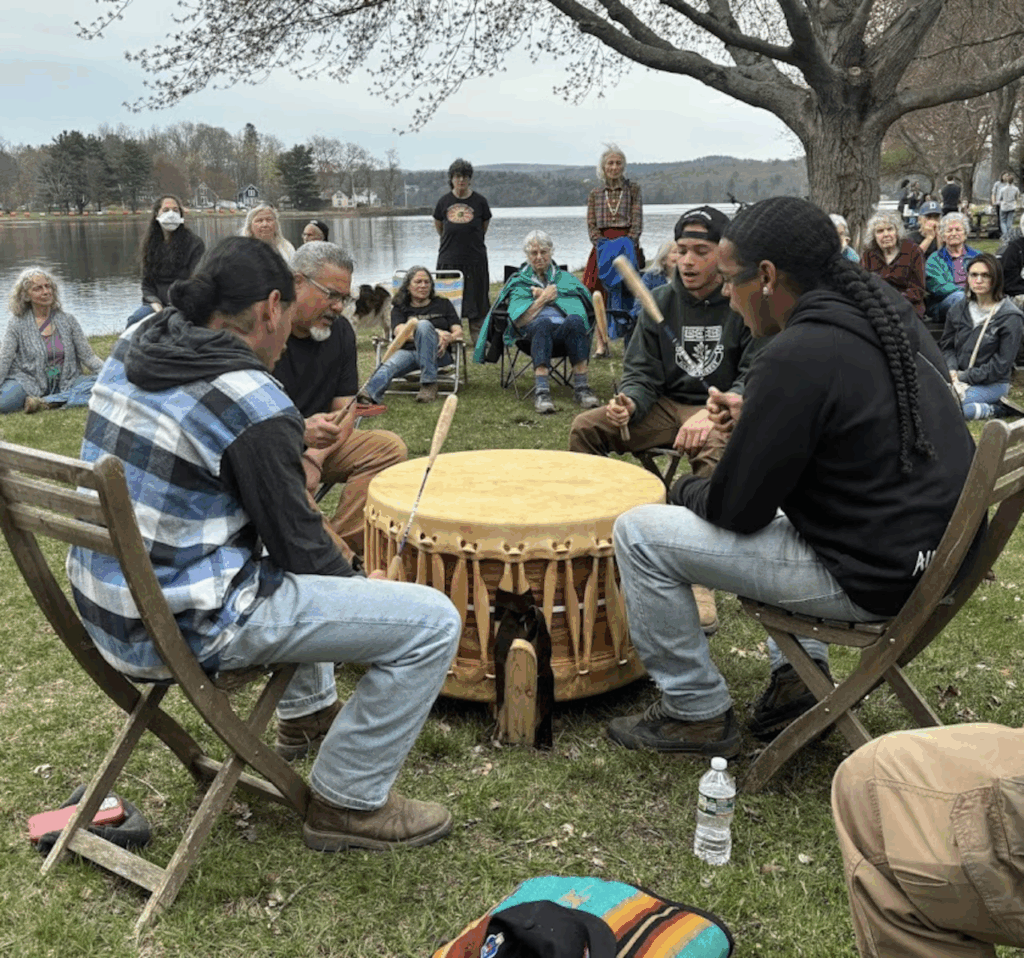By Michael Carolan | Special to The Republican Updated: Apr. 30, 2025, 5:02 p.m.|Published: Apr. 30, 2025, 5:01 p.m.

Members of the Chaubunagungamaug tribe of the Nipmuc Nation performed drumming and singing last Friday at Unity Park in Turners Falls, a village of the town of Montague. (Michael Carolan)
TURNERS FALLS — Opponents of the Northfield Mountain hydroelectric facility gathered late last week to protest its recent state relicensing and to celebrate the natural wonders of the Connecticut River.
Members of the Chaubunagungamaug tribe of the Nipmuc Nation performed drumming and singing last Friday at Unity Park in Turners Falls. The Nipmuc are Indigenous peoples of Massachusetts, Rhode Island and Connecticut.
“We are honoring those who came before us who struggled here,” said Ite Santana, a member of the tribe. “We are offering gratitude, a thank you, to this river, in our language — Kuttabotomish. And a call to repair the damage by this company to the river and to support the people who are fighting the good fight.”
On April 22, the Massachusetts Department of Environmental Protection certified the operator of the Northfield Pumped Storage Station, FirstLight, paving the way for it to obtain a 50-year license from the Federal Energy Regulatory Commission.
The station was built in 1972 to power-up on electricity from the now-closed Vermont Yankee Nuclear Power Station and pumps water about 800 feet above the Connecticut River to a man-made, 5 billion gallon storage reservoir.
Largely powered by electricity, the 1,100-megawatt station releases water to then generate energy to sell at a profit. FirstLight Power Resources is owned by the Canadian pension investment firm PSP Investments and reported $158 million in earnings from the facility in 2019.
Environmental activists, including those with the nonprofit Connecticut River Defenders, have been pressing for the facility’s closure for three years. The station “halts, cripples and reverses miles of the Connecticut River,” according to environmental scientist Karl Meyer in an opinion piece in the CommonWealth Beacon.
Meyer formerly worked at Northfield, on the safety committee and for the Connecticut River Watershed Council. The station’s “turbines annually kill hundreds of millions of eggs, larvae, and juvenile and adult fish, and other assorted aquatic species in a four-state river system,” he wrote.
In an email to The Republican, Claire Belanger, FirstLight communications manager, wrote: “While we do not agree with the characterizations made about (the station), and the calls for its shutdown, we respect the perspectives of advocates and activists, and their right to conduct peaceful and safe demonstrations.”
MassDEP Director of Communications Lauren Moreschi wrote in an email that the most recent water quality certification “provides more protections for the Connecticut River than ever before.” Input from “neighbors, advocates and stakeholders,” public hearings and scientific modeling “were critical in creating strong water quality protections included in this certification,” she wrote.
Most comments made in the public hearings held recently “actually condemned the DEP’s draft certification,” said Priscilla Lynch, of Conway, a member of the Connecticut River Defenders.
Lynch said the station creates enormous private profits at the “public expense,” wastes large amounts of energy and destroys the environment.
“Where is the full-on energy reduction program so desperately and urgently needed right now?” Lynch said. “The state is failing us.”
Gary Seldon, of Greenfield, attended the event and said that he opposed the station on moral grounds.
“All aquatic life goes through the turbines, which definitely grind up all the fish,” he said. “The station creates a greater flow than the river itself, so it runs the river backwards both ways. It’s an intense river desecration.”
Liz Cold Wind Santana Kiser, a member of the Chaubunagungamaug tribe, told The Republican at the event that the station’s certification is not a defeat.
“There’s no signature on the dotted line either way,” she said. “We will continue the fight no matter what. We must talk about what these waters are and what the damage is going to be. I think it’s important to let everybody know.”
